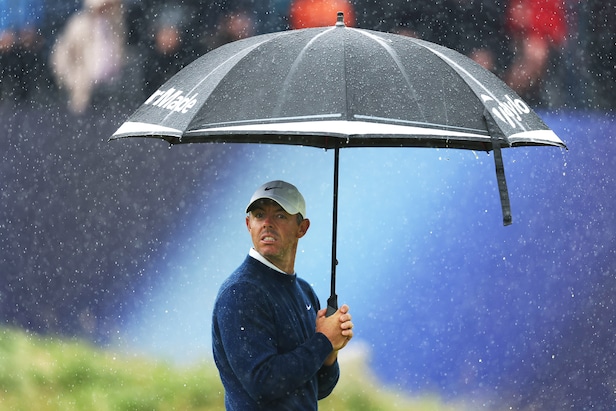Every sport has something unique that sets it apart from the rest.
For football, it’s the complexity of the Xs and Os on offense and defense. With hockey, it’s the unexpected skirmishes that go on as the referees refrain from getting involved. Superfans of soccer teams follow their clubs as if it were a matter of life and death.
In golf, it’s something along the lines of class and sportsmanship. It’s taking off your hat and shaking the other players’ hands after a round, no matter how you played. The crowd knows when to be quiet and when to let out a roar.
But now, the game’s most distinguishing attributes are up in the air.
With the major season now past the halfway mark following J.J. Spaun’s career-best performance at the U.S. Open at Oakmont Country Club, emotions are running high — and not in a positive way, either.
Composure is a commonality in sports. The difference between winning and losing sometimes comes down to who can manage their emotions best, not necessarily who has the most talent. It’s particularly applicable to golf, where one flubbed shot can put a player completely out of title contention or sent home before the weekend.
Vulgar language and negative self-talk aren’t an unfamiliar sight for the average golf fan. After all, it’s only human nature for a player to want to counteract their frustration and anger, especially if there are still holes to play. Golf, however, has separated itself from other endeavors through players’ ability to keep their emotions physically in check, which has put the game above others when it comes to a sense of honor and respect.
Recently, however, there have been a few signs that the precedent has begun to shift in the other direction.
Rory McIlroy, this year’s Masters champion and now the sixth player ever to complete the career Grand Slam, was televised chucking his iron down the fairway after a poor shot at Oakmont. In the same round, he smashed up a tee box following an unfavorable 3-wood.
McIlroy’s frustration was arguably warranted, but after donning the green jacket in Augusta, the rest of the season should be icing on the cake for him. The outburst seemed unnecessary, as he still made the cut by the end of the round.
It’s easy to excuse this outburst as an anomaly. However, the worry for the sport as a whole is that McIlroy’s flare-ups are only the beginning of a trend seen in both good and bad moments.
Scottie Scheffler has become a household name after practically dominating the PGA Tour over the last few years, and he’s almost guaranteed to be the betting favorite week after week. Despite his success, Scheffler had a questionable moment of his own at this year’s PGA Championship, which he won by five strokes.
Unlike McIlroy, Scheffler’s ‘hat spiking’ looks to be a message toward the crowd, suggesting they weren’t cheering hard enough for his runaway victory and third major title. Instead of letting the moment play out, the roars weren’t as loud as he would’ve liked, and he let fans know.
While these two instances could be categorized as one-offs, it’s concerning to see professionals acting this way even when the ball’s spinning the way they want it to. With golf becoming more of a casual sport where more players are drinking alcohol and listening to music while they play, the very foundation of the sport — attributes like elegance, humility and sportsmanship — are at risk.
When the LIV Tour first began, it offered an experience tailored to those who don’t want to tuck in their shirts and keep quiet for an entire round. Music on tee boxes, abrupt cheers from the crowd and large, hard-to-miss branding and logos on players’ shirts are more than acceptable at LIV tournaments. The league opened the door for new golfers to let loose, and play without any of the stricter expectations.
But the rigidity and rules surrounding the game are there for a reason: they’re what make it unique.
With less than a month until The Open Championship in Northern Ireland, only time will tell if these emotional moments truly mean anything about where the sport could be heading — and if it’s in any sort of jeopardy.






